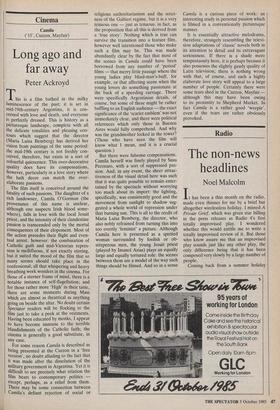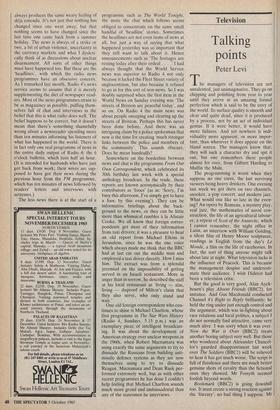Radio
The non-news headlines
Noel Malcolm
It has been a thin month on the radio, made even thinner for me by a brief but altogether wirelessless holiday. I missed A Private Grief, which was given star billing in the press releases as Radio 4's first totally improvised play. I wondered whether this would entitle me to write a totally improvised review of it. But those who know assure me that an improvised play sounds just like any other play, the only difference being that it has been composed very slowly by a large number of people. Coming back from a summer holiday always produces the same weary feeling of déjà entendu. It's not just that nothing has changed since one went away, but that nothing seems to have changed since the last time one came back from a summer holiday. The news is always of a strike or two, a bit of urban violence, uncertainty in the currency markets and what I dyslexi- cally think of as discussions about unclear disarmament. All sorts of other things must have happened too. But these are the `headlines', with which the radio news programmes have an obsessive concern. As I remarked last month, Radio 4's news service seems to assume that it is merely supplementing the diet of newspaper read- ers. Most of the news programmes strain to be as magaziney as possible, puffing them- selves full of chat and interviews in the belief that this is what radio does well. The belief happens to be correct, but it doesn't mean that there's something shamefully wrong about a newsreader spending more than ten minutes informing his listeners of what has happened in the world. There is in fact only one real programme of news in the entire daily output of Radio 4: the 6 o'clock bulletin, which lasts half an hour. (It is intended for husbands who have just got back from work; their wives are sup- posed to have got their news during the previous hour from the PM programme, which has ten minutes of news followed by readers' letters and interviews with actresses.)
The less news there is at the start of a
programme such as The World Tonight, the more the chat which follows seems obliged to concentrate on the same small handful of `headline' stories. Sometimes the headlines are not even items of news at all, but just a way of saying that what happened yesterday was so important that they still want to talk about it. Hence announcements such as 'The hostages are resting today after their ordeal . . I had always thought that the World Service news was superior to Radio 4 not only because it lacked the Fleet Street variety of anglocentrism, but also because it refused to go in for this sort of non-news. So I was doubly surprised when the first item in the World News on Sunday evening was `The streets of Brixton are peaceful today', and so on. On Radio 4 the main news was about people sweeping and clearing up the streets of Brixton. Perhaps this has never been done before. And there was an intriguing claim by a police spokesman that now is the time for creating 'much stronger links between the police and members of the community'. This sounds obscure. Does he mean handcuffs?
Somewhere on the borderline between news and chat is the programme From Our Own Correspondent, which celebrated its 30th birthday last week with a special anthology broadcast. In the trade, these reports are known acronymically by their contributors as `foocs' (as in: `Sorry, I'm busy this afternoon, I've simply got to have a fooc by this evening'). They can be informative briefings about the back- ground to the news, or they can be little more than whimsical rambles a la Alistair Cooke. We all know that foreign corres- pondents get most of their information from taxi drivers; it was a pleasure to hear an old report from Michael Elkins in Jerusalem, since he was the one voice which always made me think that the BBC had at last cut out the middle man and employed a taxi driver directly. How I miss him. The extract was from a splendid jeremiad on the impossibility of getting served in an Israeli restaurant. More in anger than in sorrow, he described the staff at his local restaurant as 'living — alas, living — disproof of Milton's claim that they also serve, who only stand and wait.'
One old foreign correspondent who con- tinues to shine is Michael Charlton, whose first progranime in The Star Wars History (Radio 4, Sundays, 5.15 p.m.) was an exemplary piece. of intelligent broadcast- ing. It was about the development of American strategy over unclear weapons in the 1960s, when. Robert Macnamara was using exactly the same arguments to try to dissuade the Russians from building anti- missile defence systems as they are now themselves using to try to dissuade Reagan. Macnamara and Dean Rusk per- formed extremely well, but as with other recent programmes he has done I couldn't help feeling that Michael Charlton sounds much more grand and ambassadorial than any of the statesmen he interviews.



























































 Previous page
Previous page